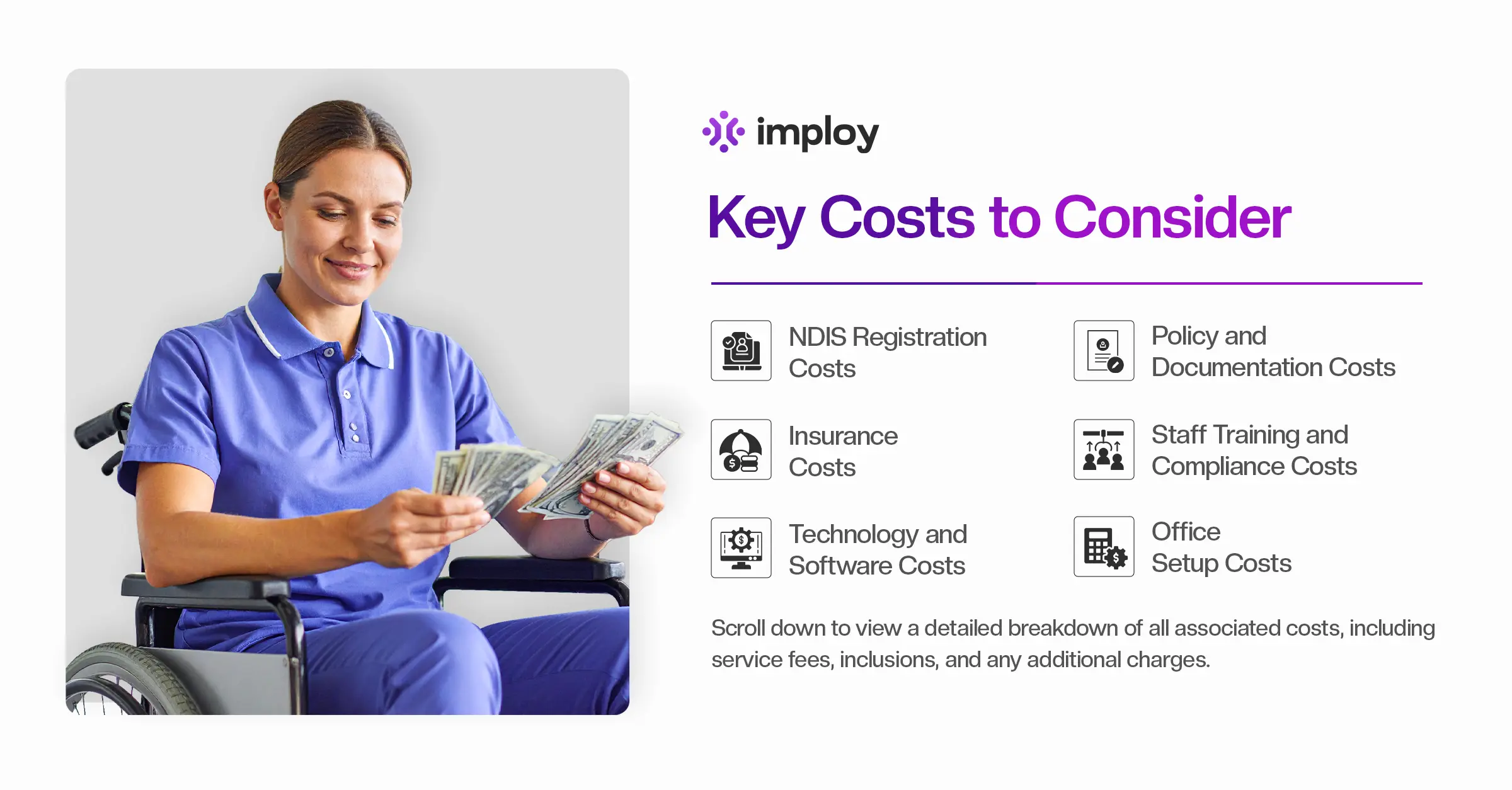How Much Does It Cost to Become an NDIS Provider in Australia?
Start your NDIS business with confidence. Learn about costs, audits, staffing, insurance, and tools to build a sustainable disability support service.

Becoming a registered NDIS provider can open the door to meaningful work and strong business growth in Australia's disability services sector. But before you jump in, it’s important to understand the costs involved because starting an NDIS business isn’t just about passion; it’s also about preparation.
In this blog, we break down the typical costs of becoming an NDIS provider and highlight what to expect depending on the size, scope, and structure of your services.

1. Registered vs Unregistered NDIS Providers
Before calculating costs, it's important to determine whether you need to register with the NDIS Commission.
- Registered providers must undergo an audit, follow the NDIS Practice Standards, and are eligible to deliver services to participants whose plans are NDIA-managed.
- Unregistered providers can only deliver to self-managed or plan-managed participants and are not subject to the same compliance obligations.
If you intend to provide personal care, nursing, or high-risk support, you must register.
2. What Are the Costs to Become an NDIS Provider?
Registering with the NDIS itself is free, but there are mandatory auditing costs tied to the NDIS Practice Standards. These audit expenses depend on factors like your business size, the complexity of your operations, and the types of services you intend to provide.
Here’s a breakdown of the key startup costs you may face when registering as an NDIS provider in Australia:
1. NDIS Registration and Audit Fees
To become registered, you'll need to apply through the NDIS Commission Provider Portal. Your registration group determines what type of audit you need:
a. Verification Audit
The Verification Audit applies to NDIS providers delivering lower-risk, less complex services. It involves a desktop review of your submitted documentation by an NDIS-approved auditor, who assesses your qualifications, policies, and compliance evidence.
The cost for this type of audit generally ranges from $900 to $1,800.
Common examples of low-risk supports include:
- Assistive products for personal care and safety
- Personal mobility aids
- Vision support tools
- Community nursing services
- Assistive technology for everyday living
- Budgeting and support fund management
- Transport assistance
- Vehicle modifications
- Household tasks like cleaning and gardening
- Hearing services and devices
- Therapeutic services and wellbeing programs
b. Certification Audit
If your NDIS business offers more complex or higher-risk services, you’ll likely need to complete a Certification Audit. This is a comprehensive assessment that evaluates your operations against the NDIS Practice Standards. It typically includes site visits, staff interviews, and discussions with participants.
The cost for a certification audit usually starts from $2,800 and can increase depending on the size and scope of your services.
Examples of high-risk or complex supports include:
- Assistance with finding or maintaining employment or tertiary education
- High-intensity personal care
- Life stage and transition support
- Specialist behaviour intervention
- Skill development for daily living
- Early intervention for young children
- Support for community and civic participation
2. Policy and Documentation Cost
Before you even book your audit, you’ll need to have all the right policies, procedures, and documentation in place that demonstrate your compliance with the NDIS Practice Standards. These documents are what auditors review to assess whether your business meets NDIS requirements, meaning they're a prerequisite to passing the audit.
These include essential documents like:
- Incident and complaints management policies
- Risk management frameworks
- Participant rights and safeguarding procedures
- Service delivery plans
- HR and onboarding processes
You can prepare these documents in several ways:
- DIY (if you’re confident with compliance): Free, but very time-consuming and risky if done incorrectly.
- Buy policy packs/templates: Prices range from $500 to $2,000 depending on how comprehensive and customisable the templates are.
- Hire a consultant or compliance specialist: Tailored document support typically costs $3,000 to $5,000+, and some packages may include audit readiness support.
3. Office Setup Cost
Whether you're launching your NDIS business from home or leasing a dedicated space, it's important to account for office setup expenses. Renting a commercial office can range from $1,000 to $4,000 per month, depending on the location, size, and facilities. In addition, you'll need to budget $2,000 to $5,000 for furnishings, equipment, and essential office supplies to create a functional and professional workspace.
4. Insurance Costs
NDIS providers must hold:
- Public Liability Insurance
- Professional Indemnity Insurance
- Workers Compensation Insurance (if employing staff)
Costs vary depending on your risk exposure, and business size:
- Estimated Range: $500 - $3,000 per year
5. Staff Training and Screening Costs
You’re responsible for ensuring your team meets NDIS requirements, including:
- NDIS Worker Screening Check: $100 per worker.
- Staff Training Cost: $200 - $2000 depending upon the course.
6. Business and Admin Software
Managing clients, staff, rosters, and compliance requires reliable software. imploy and other platforms help with:
- Smart rostering
- Worker qualifications tracking
- Geo-fenced mobile app
- Award compliance (SCHADS/NDIS)
Many providers start with imploy’s all-in-one system to simplify rostering, compliance, and client management from day one.
The cost of these tools can vary depending on the features required, but most providers spend between $1,000 and $5,000 annually on software subscriptions. In addition, you’ll need to invest in essential equipment like computers, phones, and other hardware, which can add another $2,000 to $5,000 in initial setup costs.
3. Ongoing Costs
1. Ongoing Operational Costs
Running an NDIS business involves regular expenses such as utilities, rent, internet, and general admin costs. These ongoing costs typically fall between $1,000 and $3,000 per month, depending on the scale and complexity of your operations.
2. Staffing Cost
Hiring staff or contractors is essential for delivering NDIS services effectively. However, staffing can be one of your biggest expenses. Salaries for qualified support workers typically range from $30,000 to $50,000 per year, depending on the services offered and your location. In addition to wages, you'll also need to account for superannuation, payroll tax, and other employment-related costs.
3. Premises Costs
If you’re not planning to run your NDIS business from home, you’ll need to factor in the expense of leasing or purchasing a physical location. These costs can vary widely depending on your business’s size, location, and operational needs.
For example, a small co-working space might cost around $150 per week, while leasing larger commercial premises could run into the thousands per month.
4. Marketing and Business Development Cost
You can’t grow your NDIS business if potential clients don’t know you exist. That’s why having a solid marketing strategy is essential for building awareness and attracting the right participants to your services.
Depending on your approach, the marketing expenses for a new NDIS business may include:
- Website development and setup
- Paid advertising on social platforms
- SEO planning and execution
- Membership fees for networking groups
Alternatively, you may opt to engage a marketing agency to manage everything for you. This route can cost several thousand dollars per month, depending on the scope of services and your business goals.
Taking all factors into account, the total startup cost for an NDIS business can range from $10,000 to $40,000 or more. This figure will vary widely depending on your location, service offerings, and business model.
4. How to Reduce Your Initial Setup Costs?
Starting an NDIS business doesn’t have to break the bank. Here are a few ways to reduce your upfront expenses:
1.Start with Low-Risk Registration Groups
Choose services like household tasks or group/community participation to qualify for Verification (not Certification) audit, which is cheaper and faster.
2.Use Policy Templates
Instead of hiring consultants, use affordable pre-built policy and procedure packs that meet NDIS standards. Just make sure they’re kept up to date.
3.Bundle Your Audit and Documentation
Some NDIS consultants offer bundled services (e.g., policies + audit prep), which can be more affordable than sourcing separately.
4.Leverage All-in-One Software
Platforms like imploy reduce the need for multiple subscriptions by handling rostering, compliance, mobile workforce tracking, and award interpretation in one system.
5. Choose Software Built for Sole Traders
Many new providers overspend on complex platforms with features they don’t need. Instead, consider NDIS software for small providers, which offers essential tools like rostering, invoicing, and compliance tracking all in a simplified, budget-friendly package that scales with your business.
5. Is Becoming an NDIS Provider Worth It?
While the setup costs and compliance requirements can be significant, becoming a registered NDIS provider offers substantial long-term benefits. With growing demand for disability support services across Australia, providers have the opportunity to build a sustainable and purpose-driven business.
Registration also gives you access to a broader client base, including NDIA-managed participants, and enhances your credibility in the market. If you're committed to delivering high-quality, person-centred care, and are willing to invest the time and resources into doing it right, the NDIS can be a rewarding space to grow professionally and financially.
Conclusion
Starting an NDIS business is a meaningful step, but it comes with real financial and operational commitments. From audits and insurance to staffing, technology, and marketing, the initial costs can add up quickly. However, with the right preparation, tools, and support, these investments can lead to a sustainable and impactful business in a growing sector. As a new service provider, you must understand that the total initial cost to become as NDIS Provider ranges from around $10,000 to $40,000 or even more, which totally depends upon the size of your company.
By understanding your obligations and budgeting wisely, you can avoid common pitfalls and position your NDIS business for long-term success. Whether you're just starting out or scaling up, platforms like imploy can help streamline rostering, compliance, and workforce management, so you can focus on what matters most: delivering quality care.
FAQs
1. Is it free to register as an NDIS provider?
Yes, registration itself is free through the NDIS Commission. However, you’ll need to cover additional costs such as audits, insurance, and documentation to become fully compliant.
2. What’s the difference between verification and certification audits?
- Verification audits apply to low-risk services (e.g. cleaning, assistive products) and cost approximately $900–$1,500.
- Certification audits are required for higher-risk, complex supports and can exceed $3,000, often involving site visits and participant interviews.
3. Do I need insurance to start an NDIS business?
Yes. NDIS providers must have public liability and professional indemnity insurance, with annual premiums ranging from $500 to $3,000, depending on your business size and risk level.
4. Can I start my NDIS business from home?
Absolutely. Many providers begin from home to keep overheads low. However, if you require office space, co-working setups start at about $150 per week, while commercial leases can cost significantly more.
5. How can I reduce the cost of starting an NDIS business?
To minimise expenses:
- Start from home to save on rent.
- Use pre-built policy templates.
- Handle initial marketing in-house.
- Choose affordable, all-in-one NDIS software like imploy to avoid tool duplication.





